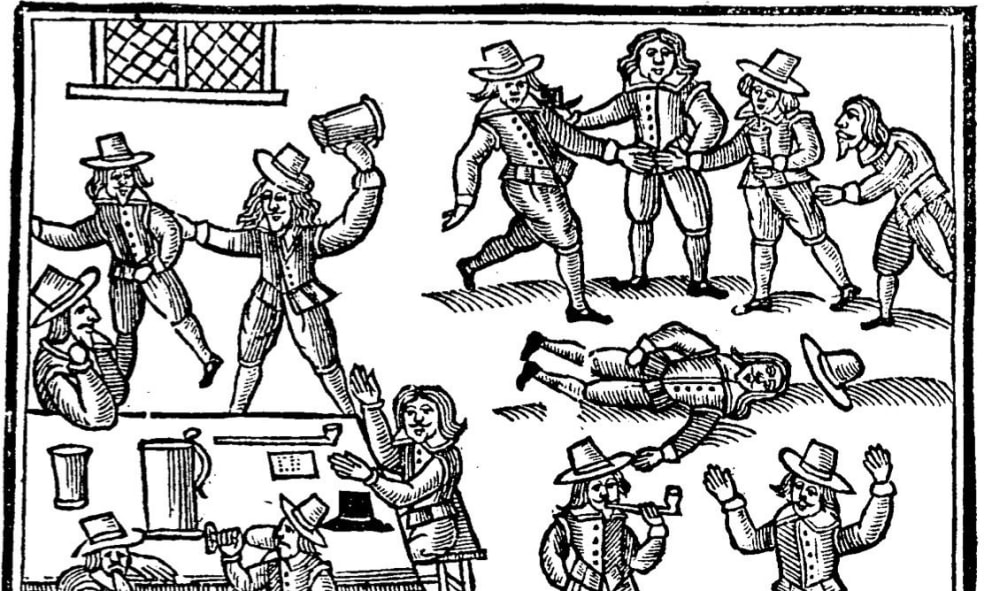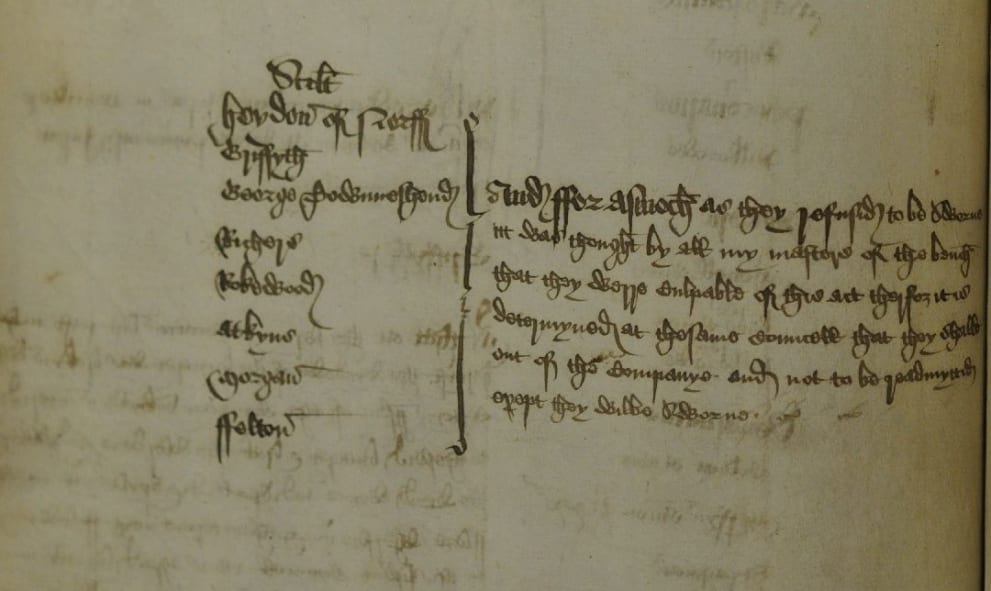August 2015 – Lett out the wyne

One of the features of student life at the Inns from the medieval period until the middle of the seventeenth century that sounds odd to modern ears is that not only did students have to keep terms but also vacations.
Term time (which still survives in residual form as ‘dining periods’) coincided with the legal terms when the courts sat at Westminster. These were relatively short – the Michaelmas term was about seven weeks but the other three terms only about three weeks each. During term the students were fully occupied attending the sessions of the courts, which was an essential element of their education. Formal tuition thus had to take place in the vacations.
The most elaborate kind of tuition was a series of lectures, called readings, held twice a year, in Lent and Autumn, during what was called the ‘learning vacation’ (in contrast to the ‘mean vacation’ which was the remaining period outside term). Each lasted just over three weeks, and one of the most learned barrister members gave a series of lectures based on the text of a statute. During the period featured below, about fifteen of these readings would have been given. Each lecture was then followed up with a demanding version of what we would call a ‘Q & A’ session in which benchers, barristers and students all participated. The readings were a high point in the Inn’s calendar accompanied by much wining and dining, with important guests often also attending the festivities.
The Autumn reading (which we would perhaps regard as still being in summer) always started on the first Monday of August which in 1530, the year of the incident described, just happened to fall on the 1 August. Hence this interesting story can fit into an August Archive of the Month, and belies the notion that it has always been the case that nothing much happens at the Inn during August.
The Black Books in November 1530 record a shocking episode that occurred ‘at the lernyng vacacion last past in haruyst’. The Inn’s cellars were broken into and the wine stored there was spilled and also, presumably, drunk. This crime was, however, not carried out by outsiders but by members of the Inn themselves. The Black Books describe how ‘the window of the buttery was broken, whereby certain persons of the Company unknown entered into the said buttery, and brake the cellar door, and let out the wine, and spoiled and spilt it in the floor’. A group of eight members of the Inn, both benchers and barristers were thought to be the prime suspects but all refused to ‘grass up’ any of their friends. As a result they were all expelled from the society until they either admitted to carrying out the crime or provided information that implicated one of the other suspects.
The eight members were Richard Heydon (admitted 23 December 1522), Edward Griffyn (16 February 1521), George Towneshend (20 November 1528), Henry Richers (3 July 1529), Nicholas Rokewood (or Rookwood) (20 November 1525), Thomas Atkyns (8 February 1524), Richard Morgan (31 July 1524) and Robert Felton (5 March 1530).
The details of the event occupy six pages of the Black Books. The names of the suspects are clearly listed on the bottom left hand side of the page shown below.

It appears the men were a relatively close knit group (and Sir John Baker’s recent The Men of Court 1440-1550 is invaluable in providing some of the details). They were all roughly in their mid to late 20s in 1530. Thomas Atkyns and Richard Heydon appear to have shared chambers for a period which essentially means they were room mates. Heydon then went on to share chambers with Towneshend in 1532. Edward Griffyn, was a repeat trouble maker and before the 1530 incident he is noted as having punched William Tankard with his fist in 1523 and, along with Richard Heydon and George Towneshend, was fined for beating Thomas Butler’s wife in 1529. He was then later fined by the Inn for refusing to be butler and Christmas Marshal. It is later mentioned that he was left a gold ring in Nicholas Rokewood’s will suggesting that the two men maintained a lifelong friendship. Townesend and Richers were also not strangers to stealing things with Towneshend being fined in 1529 for stealing sacks of coal and Henry Richers being fined, also in 1529, for breaking into the kitchen and stealing faggots or bundles of wood.
It is not difficult to imagine that being the most senior member of the Inn involved, Edward Griffyn was in an excellent position to have egged on the other younger members into leading them astray in such a serious manner. What remains a matter of speculation is what provoked the incident. The impression is given that wine was not in short supply during readers’ dinners. But disorder and rebelliousness seem to have been somewhat rife at the time, and having to sit through fifteen lectures (each occupying most of a morning) may have done nothing to quell that spirit.
The affair, in the event, however, was rapidly resolved at the behest of Robert Norwych and Thomas Wylloughby who were both King’s Serjeants-at-law no less. Their personal intervention secured the readmission of the expelled members at a cost of 5 marks each, except for Griffyn who paid the lesser fine of 40s ‘bycause he sware parte of the othe’ which possibly suggests his conscience may have started to get the better of him.
Despite the misdemeanours of their youth, however, four of these men went on to be Treasurers; Griffyn in 1539, Heydon in 1542, Atkyns in 1544 and Morgan in 1545.
